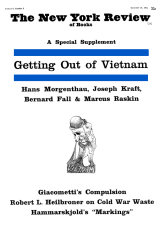In response to:
The Christian Pope from the June 17, 1965 issue
To the Editors:
I have read Hannah Arendt’s review of Pope John’s Diary with great interest: as always, her judgment is clearsighted and clear-headed, and I wish to express my admiration for her most remarkable insight into the character of a man who, by personality and background, was so far distant from herself. On two points I should like to add a comment from personal observation. The words “I am Joseph your brother” were in Pope John’s mouth very frequently during the first weeks of his Pontificate. I heard them the first time in his speech during the coronation-ceremony, and in the pomp of that circumstance they were extremely touching. During the following weeks he used them again and again (as was his custom when he had found a felicitous expression for what occupied his mind) and I remember distinctly that he was reported to have repeated them to the Jewish delegation, in which case they took on a deeper and, as Hannah Arendt says, very great meaning—though whether I have this from the papers at the time or from hearsay I do not now recollect. (In those days it was not easy to follow Pope John’s speeches in the Osservatore Romano, for—though it had been in the habit of introducing Pope Pius’s speeches with the words “as we have gathered it from the August lips”—the then Editor Count Della Torre was embarrassed by Pope John’s custom of improvising, and also by his use of the first person singular, which the Osservatore invariably transposed in the third person: the Pope said that he…) In any case, I am sure that the Pope used the words from Genesis frequently in those days, and I consider it highly likely that he spoke them both to the Cardinals and to the Jewish delegation.
In the second place it seems to me that Hannah Arendt rather too readily accepts the “fact that…in his later life [he] was without any marked intellectual or scholarly interest whatsoever”—which I consider at least partly legendary. Apart from the fact that as a young priest he taught at the Lateran University and that later on he published a critical edition of the Acts of Charles Borromeo’s pastoral journeys—admittedly of limited, and in Roncalli’s case, primarily pious interest, but nevertheless a scholarly achievement—his grasp of complicated theological and pastoral problems that were debated before and during his Pontificate showed a far greater erudition than the pious legend, which already has been formed, will admit. It is easy to be deceived by the simple language of his speeches and encyclicals, but to those who were familiar with some of the questions they treated, they showed an awareness of the issues that went far beyond the mere “peasant shrewdness” with which the hagiographers want to endow him. His unpolemical nature did not lead him to speak out against existing opinions, but rather to replace them with positive alternatives, and this made it sometimes difficult to detect the intellectual process behind some of his utterances; perhaps, in a way, even for himself—for they were clearly the fruits of a harmonious growth in which it is hard to discover breaks and new beginnings. This may be the reason why (as Hannah Arendt points out) “even the few instances of an intellectual development in the Journal remained strangely unnoticed by its author” (supposing, for the moment, that a spiritual diary were the right place for such an exercise). With all this, I do not want to depict Pope John as an “intellectual.” He himself had no such pretension: the words “I am Joseph your brother” were quoted in his coronation speech precisely to disappoint those who had expectations of this kind, and the pastoral emphasis of his Pontificate and of the Council he initiated indicated where his true interests lay. Nevertheless, John XXIII’s greatness seems to me to consist in the co-existence of a touching simplicity with true intellectual stature; not to recognize this is often (though obviously not in Miss Arendt’s case) part of an attempt to make him “harmless.”
(Rev.) Henry ten Kortenaar
Pittsburgh
This Issue
September 16, 1965



